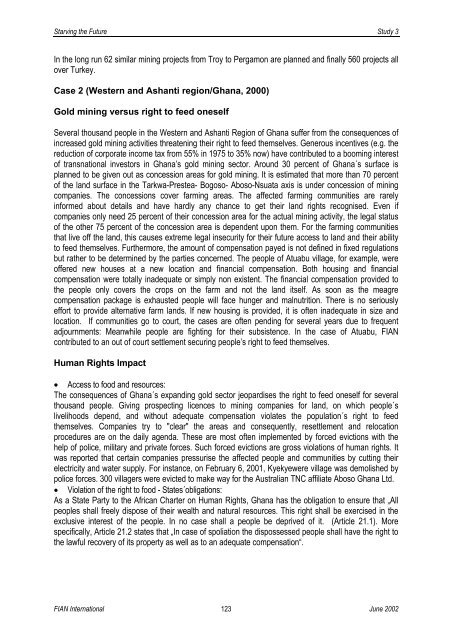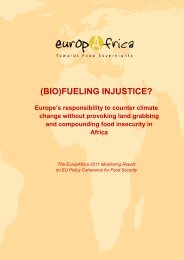Study 3: Ecodestruction and the Right to Food: The Cases of Water ...
Study 3: Ecodestruction and the Right to Food: The Cases of Water ...
Study 3: Ecodestruction and the Right to Food: The Cases of Water ...
You also want an ePaper? Increase the reach of your titles
YUMPU automatically turns print PDFs into web optimized ePapers that Google loves.
Starving <strong>the</strong> Future <strong>Study</strong> 3<br />
In <strong>the</strong> long run 62 similar mining projects from Troy <strong>to</strong> Pergamon are planned <strong>and</strong> finally 560 projects all<br />
over Turkey.<br />
Case 2 (Western <strong>and</strong> Ashanti region/Ghana, 2000)<br />
Gold mining versus right <strong>to</strong> feed oneself<br />
Several thous<strong>and</strong> people in <strong>the</strong> Western <strong>and</strong> Ashanti Region <strong>of</strong> Ghana suffer from <strong>the</strong> consequences <strong>of</strong><br />
increased gold mining activities threatening <strong>the</strong>ir right <strong>to</strong> feed <strong>the</strong>mselves. Generous incentives (e.g. <strong>the</strong><br />
reduction <strong>of</strong> corporate income tax from 55% in 1975 <strong>to</strong> 35% now) have contributed <strong>to</strong> a booming interest<br />
<strong>of</strong> transnational inves<strong>to</strong>rs in Ghana’s gold mining sec<strong>to</strong>r. Around 30 percent <strong>of</strong> Ghana´s surface is<br />
planned <strong>to</strong> be given out as concession areas for gold mining. It is estimated that more than 70 percent<br />
<strong>of</strong> <strong>the</strong> l<strong>and</strong> surface in <strong>the</strong> Tarkwa-Prestea- Bogoso- Aboso-Nsuata axis is under concession <strong>of</strong> mining<br />
companies. <strong>The</strong> concessions cover farming areas. <strong>The</strong> affected farming communities are rarely<br />
informed about details <strong>and</strong> have hardly any chance <strong>to</strong> get <strong>the</strong>ir l<strong>and</strong> rights recognised. Even if<br />
companies only need 25 percent <strong>of</strong> <strong>the</strong>ir concession area for <strong>the</strong> actual mining activity, <strong>the</strong> legal status<br />
<strong>of</strong> <strong>the</strong> o<strong>the</strong>r 75 percent <strong>of</strong> <strong>the</strong> concession area is dependent upon <strong>the</strong>m. For <strong>the</strong> farming communities<br />
that live <strong>of</strong>f <strong>the</strong> l<strong>and</strong>, this causes extreme legal insecurity for <strong>the</strong>ir future access <strong>to</strong> l<strong>and</strong> <strong>and</strong> <strong>the</strong>ir ability<br />
<strong>to</strong> feed <strong>the</strong>mselves. Fur<strong>the</strong>rmore, <strong>the</strong> amount <strong>of</strong> compensation payed is not defined in fixed regulations<br />
but ra<strong>the</strong>r <strong>to</strong> be determined by <strong>the</strong> parties concerned. <strong>The</strong> people <strong>of</strong> Atuabu village, for example, were<br />
<strong>of</strong>fered new houses at a new location <strong>and</strong> financial compensation. Both housing <strong>and</strong> financial<br />
compensation were <strong>to</strong>tally inadequate or simply non existent. <strong>The</strong> financial compensation provided <strong>to</strong><br />
<strong>the</strong> people only covers <strong>the</strong> crops on <strong>the</strong> farm <strong>and</strong> not <strong>the</strong> l<strong>and</strong> itself. As soon as <strong>the</strong> meagre<br />
compensation package is exhausted people will face hunger <strong>and</strong> malnutrition. <strong>The</strong>re is no seriously<br />
effort <strong>to</strong> provide alternative farm l<strong>and</strong>s. If new housing is provided, it is <strong>of</strong>ten inadequate in size <strong>and</strong><br />
location. If communities go <strong>to</strong> court, <strong>the</strong> cases are <strong>of</strong>ten pending for several years due <strong>to</strong> frequent<br />
adjournments: Meanwhile people are fighting for <strong>the</strong>ir subsistence. In <strong>the</strong> case <strong>of</strong> Atuabu, FIAN<br />
contributed <strong>to</strong> an out <strong>of</strong> court settlement securing people’s right <strong>to</strong> feed <strong>the</strong>mselves.<br />
Human <strong>Right</strong>s Impact<br />
• Access <strong>to</strong> food <strong>and</strong> resources:<br />
<strong>The</strong> consequences <strong>of</strong> Ghana´s exp<strong>and</strong>ing gold sec<strong>to</strong>r jeopardises <strong>the</strong> right <strong>to</strong> feed oneself for several<br />
thous<strong>and</strong> people. Giving prospecting licences <strong>to</strong> mining companies for l<strong>and</strong>, on which people´s<br />
livelihoods depend, <strong>and</strong> without adequate compensation violates <strong>the</strong> population´s right <strong>to</strong> feed<br />
<strong>the</strong>mselves. Companies try <strong>to</strong> "clear" <strong>the</strong> areas <strong>and</strong> consequently, resettlement <strong>and</strong> relocation<br />
procedures are on <strong>the</strong> daily agenda. <strong>The</strong>se are most <strong>of</strong>ten implemented by forced evictions with <strong>the</strong><br />
help <strong>of</strong> police, military <strong>and</strong> private forces. Such forced evictions are gross violations <strong>of</strong> human rights. It<br />
was reported that certain companies pressurise <strong>the</strong> affected people <strong>and</strong> communities by cutting <strong>the</strong>ir<br />
electricity <strong>and</strong> water supply. For instance, on February 6, 2001, Kyekyewere village was demolished by<br />
police forces. 300 villagers were evicted <strong>to</strong> make way for <strong>the</strong> Australian TNC affiliate Aboso Ghana Ltd.<br />
• Violation <strong>of</strong> <strong>the</strong> right <strong>to</strong> food - States´obligations:<br />
As a State Party <strong>to</strong> <strong>the</strong> African Charter on Human <strong>Right</strong>s, Ghana has <strong>the</strong> obligation <strong>to</strong> ensure that „All<br />
peoples shall freely dispose <strong>of</strong> <strong>the</strong>ir wealth <strong>and</strong> natural resources. This right shall be exercised in <strong>the</strong><br />
exclusive interest <strong>of</strong> <strong>the</strong> people. In no case shall a people be deprived <strong>of</strong> it. (Article 21.1). More<br />
specifically, Article 21.2 states that „In case <strong>of</strong> spoliation <strong>the</strong> dispossessed people shall have <strong>the</strong> right <strong>to</strong><br />
<strong>the</strong> lawful recovery <strong>of</strong> its property as well as <strong>to</strong> an adequate compensation“.<br />
FIAN International 123<br />
June 2002
















